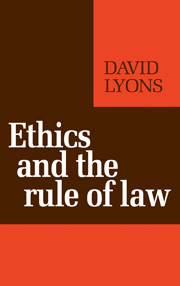Summary
Our focus now shifts from morality to law. Although reflection about the nature of law goes back to ancient times, it is useful to begin our study of legal theory with the ideas presented by John Austin in the last century. For Austin provides one of the first highly developed theories of law, which incorporates both ideas about law and more general philosophical assumptions whose influence remains quite strong today.
Austin was influenced most directly by Bentham, whose theory of law was spurred by eighteenth-century movements for codification and reform of law. As codification requires the replacement of somewhat independent judicial decisions on specific cases by a systematic code of laws, Bentham was drawn into legal philosophy because he wished to base his codification proposals on an understanding of law's basic elements. But Bentham's principal analytic study, Of Laws in General, though completed in the eighteenth century, was not published until recently, so it had much less influence on the development of jurisprudence than Austin's more familiar works. Austin's writings set the stage for contemporary jurisprudential controversies.
As we have seen, Austin develops his theory of law within the framework of a more general theory of norms governing human conduct. Any law “properly so called,” whether made by God or humans, is “a rule laid down for the guidance of an intelligent being by an intelligent being having power over him.” Laws “properly so called” are commands, which are attributable to individuals who are able and willing to impose sanctions in case of noncompliance.
- Type
- Chapter
- Information
- Ethics and the Rule of Law , pp. 36 - 60Publisher: Cambridge University PressPrint publication year: 1983



